(推荐)新概念第一册101课-直接引语与间接引语1和反义疑问句概要
新概念一 101课

soon
adv.不久, 很快, 早
New Words
我们很快就 回来。
我们一会再见。
write v.写,写字;写作
他写了几本很有名的书。
New Words
He wrote some very famous books.
Play a game
不久
youth card
hotel
协会
卡 苏格兰 Scotland 青年
hostel
n.招待所
a hostel for the homeless
无家可归者的收容所
New Words
hotel
[həu'tel] n. 宾馆
association
n.协会,联盟
New Words
the Football Association
足球协会
association Youth Hostel Association
does
Where else Who else What else does he say?
will
I'll write write a a letter letter soon.
I hope you are all well.
Speak loudly
I'm afraid
I'm afraid I can't hear you.
答案
语法小结
“一随主”是指在直接引语变间接引 语时,如果从句中的主语是 第一人称或被第一人称所修饰。从句 中的人称要按照主句中主 语的人称变化如: She said. "My brother wants to go with me. "→ She said her brother wanted to go with her.
新概念英语第一册 lesson 101

练习
每人说一句话(直接引语) 下一个人转述(间接引语)
Read it out loud together.
Activity: Who has more words?
Scotland Card Youth Hostel Association Write
谁想不到,就谁接受惩罚,赢者加※
惩罚:跳着读课文
What can you say about this picture?
Listen and answer the question
1. Where is Jimmy now? 2. Is the grandmother happy? 3. Why?
Line 1 祈使句
1. 概念 命令,建议等句子,主要以句子开头
前肯后否的反义疑问句,容易回答。 You can swim, can’t you?
每人造一句,问下一个同学
前否后肯的回答,是就是,不是 就不是
You are not a teacher, are you? No, I am not.
上面的中文翻译是: 你不是老师,是吧? 是的,我不是.
要避开中文思维,是就是,不是就不是
More practice
You don’t like TPR, do you? He isn’t your brother, is he? She doesn’t play football, does she? You aren’t my student, are you? TPR isn’t very bad, is it? The dog isn’t yours, is it?
She won’t go to school tomorrow, will she?
新概念英语第一册lesson101-102最新精编超详细讲解
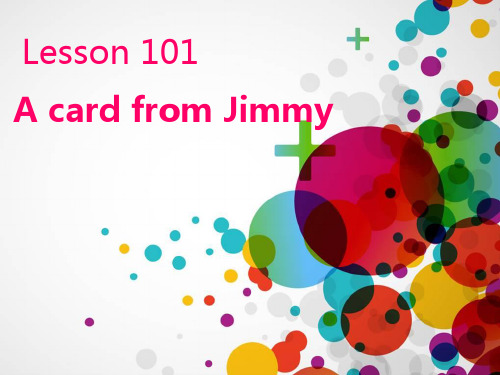
?
• 5. They weren’t in Hangzhou last week, were they ?
• 6. He can speak a little French, can’t he
?
• 7. He can speak little French, can he
?
• 8. She never went to Shanghai, did she
6.陈述部分带有seldom, hardly, never, rarely, few, little, nowhere, nothing等否定词或半否 定词时,附加疑问部分的动词用肯定形式。如: Bob rarely got drunk, did he?
如果陈述部分的否定词带有否定前缀,那么,该 陈述部分作肯定处理,附加疑问部分一般仍用否 定形式。如:
He kept his youth. 他青春依旧
hotel hostel
association n.协会,联盟
CFA=China Football Association
中国足球协会 NBA= China Basketball Association
中国篮球协会
write v.写,写字;写作 write -- wrote-- written
3. 当陈述部分的主语是不定代词everything, nothing, anything, something时,附加 疑问句用it Everything seems all right now, doesn’t it? Nothing is kept in good order, is it?
Dear Mum
I haveHjue satyasrhrei’vsejdusitnarSrcivoetdlainnSdcotland.
新概念英语第一册第101课

提问时间
• What is Penny doing? • For whom? • Whose card. • Where is Jimmy now? • Has Jimmy stayed in scotland for a long time? • Where is he staying now? • Why can he stay at a Youth Hostel? • Will Jimmy write a letter soon? • What does Jimmy hope? • Why does grandmother ask Penny to speak up?
• Jimmy wrote a lot on the card, didn't he?
• Is grandmother very happy about this?
课后作业
• 1、请完成练习册上的作业。 • 2、背诵课文。
新 概 念 英 语第 一 册
Lesson 101 A card from Jimmy
词 汇
• • • • • • • Scotland n. card n. youth n. hostel n. association n. soon adv. write(wrote, written) v. • • • • • • • • • business card birthday card name card postcard a youth of twenty youth club youth center hotel motel
反意疑问句:
• •
• • • • • • • • • • • •
首先,明白语法的含义。 询问某种情况是否真实,或者别人是 否同意自己。 分为两部分: 逗号前面为主句;后面为反意疑问句。 当前面是肯定句时,后面是否定句。 当前面是否定句时,后面是肯定句。 特点: 1. 问句的主语与主句的主语一致; 2.前后的助动词一致; 3.前后的时态一致。 Sally can speak French, can't she? Sally can't speak French, can she? 升调 - 表示疑问,期待对方回答。 降调 - 语气确定,不需要回答。
(完整版)新概念英语第一册反义疑问句整理
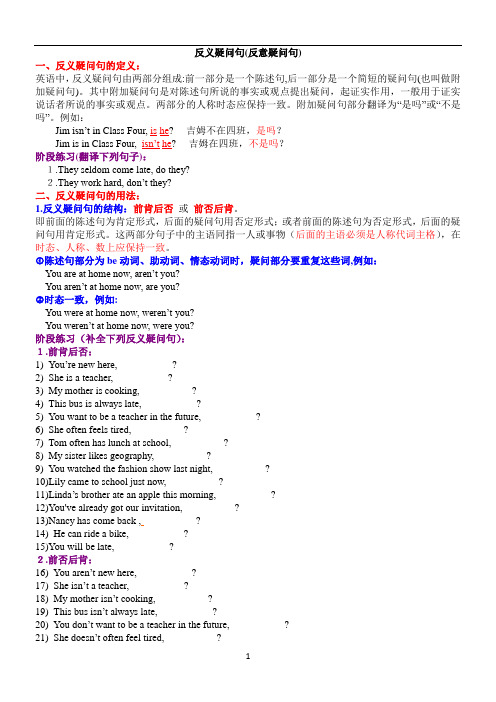
反义疑问句(反意疑问句)一、反义疑问句的定义:英语中,反义疑问句由两部分组成:前一部分是一个陈述句,后一部分是一个简短的疑问句(也叫做附加疑问句)。
其中附加疑问句是对陈述句所说的事实或观点提出疑问,起证实作用,一般用于证实说话者所说的事实或观点。
两部分的人称时态应保持一致。
附加疑问句部分翻译为“是吗”或“不是吗”。
例如:Jim isn’t in Class Four, is he? 吉姆不在四班,是吗?Jim is in Class Four, isn’t he? 吉姆在四班,不是吗?阶段练习(翻译下列句子):1.They seldom come late, do they?2.They work hard, don’t they?二、反义疑问句的用法:1.反义疑问句的结构:前肯后否或前否后肯。
即前面的陈述句为肯定形式,后面的疑问句用否定形式;或者前面的陈述句为否定形式,后面的疑问句用肯定形式。
这两部分句子中的主语同指一人或事物(后面的主语必须是人称代词主格),在时态、人称、数上应保持一致。
①陈述句部分为be动词、助动词、情态动词时,疑问部分要重复这些词,例如:Yo u are at home now, aren’t you?You aren’t at home now, are you?②时态一致,例如:You were at home now, weren’t you?You weren’t at home now, were you?阶段练习(补全下列反义疑问句):1.前肯后否:1) You’re new here, _____ _____?2) She is a teacher, _____ _____?3) My mother is cooking,_____ _____?4) This bus is always late, _____ _____?5) You want to be a teacher in the future, _____ _____?6) She often feels tired,_____ _____?7) Tom often has lunch at school,_____ _____?8) My sister likes geography,_____ _____?9) You watched the fashion show last night,_____ _____?10)Lily came to school just now,_____ _____?11)Linda’s brother ate an apple this morning, _____ _____?12)You've already got our invitation,_____ _____?13)Nancy has come back , _____ _____?14) He can ride a bike, _____ _____?15)You will be late, _____ _____?2.前否后肯:16) You aren’t new here, _____ _____?17) She isn’t a teacher, _____ _____?18) My mother isn’t cooking,_____ _____?19) This bus isn’t always late, _____ _____?20) You don’t want to be a teacher in the future, _____ _____?21) She doesn’t often feel tired,_____ _____?22) Tom doesn’t often have lunch at school,_____ _____?23) My sister doesn’t like geography,_____ _____?24)You didn’t watch the fashion show last night,_____ _____?25)Lily didn’t come to school just now,_____ _____?26)Linda’s brother didn’t eat an apple this morning, _____ _____?27)You haven’t already got our invitation,_____ _____?28)Nancy hasn’t come back , _____ _____?29) He can’t ride a bike, _____ _____?30)You won’t be late, _____ _____?三、反意疑问句的回答:反义疑问句结构是一种简略的一般疑问句,所以一般用Yes, No来回答。
新概念英语第一册笔记 Lesson 101 A Card from Jimmy

新概念英语第一册笔记Lesson 101A Card from Jimmy一、教学目的掌握直接引语变间接引语的一般用法初步了解反意疑问句二、教学重点直接引语变间接引语反意疑问句三、教学难点直接引语变间接引语反意疑问句四、教学标准按课本要求将直接引语变成间接引语识别反意疑问句五、教学内容语法点:直接引语变间接引语的一般规则反意疑问句的结构语言点:运用间接引语转述别人的话语音:语调-特殊疑问句的语调六、扩展练习替他人转述Words and ExpressionsScotland n. 苏格兰(英国)card n. 明信片youth n. 青年hostel n. 招待所,旅馆(简易的)For England For Scotland For Wales association n. 协会soon adv. 不久write(wrote, written) v. 写★Scotland n. 苏格兰(英国)The United Kingdom of Great Britain and Northern IrelandUnion Jack ★card n. 明信片--post card 明信片--credit card 信用卡--an ID card 身份证★hostel n. 招待所,旅馆(简易的)--hotel:宾馆,设施比较好的旅店--inn:(尤指乡村或公路边的)旅馆,小客栈--motel:汽车旅馆★youth1)n. 青年人,年轻人(单复数同形)--The youth of the nation is polite in general.该国的青年人一般都有礼貌2)青年(少年)时期,青春时期-- He spent his youth in the U.S.A 他少年时代在美国度过--He studied Italian in his youth. 他年轻时学过意大利语。
3)青春--She lost her youth. 她青春不再--She kept her youth. 她青春依旧★association n. 协会--My father was the president of the dental association.我父亲是牙医协会的会长。
新概念英语第一册101-110课自学笔记(很全、很好)

Lesson 101write [ ] wrote [ ] written [ ]1.Read Jimmy’s card to me , Penny.read后面接了两个宾语,一个是Jimmy’s card ,一个是me,所以,这句话还可以这样来说:Read me Jimmy’s card please.2.直接引语和间接引语“I have just arrived in Scotland and I’m staying at a Youth Hostel.”这是一个直接引语的例子。
直接引语是英文中用书面语的形式来表示口语的方式,实际的话要放在引号之间,句尾的标点符号也要放在引号之内。
下面三句都属于间接引语:He says he’s just arrived in Scotland.He says he’s staying at a Youth Hostel.He says he’ll write a letter soon.3. the Y.H.A.=the Youth Hostels Association青年招待所协会。
简称“青招协”。
the Youth Hostel是一种为参加野外探险度假活动的青年人提供廉价住宿的招待所。
这种青年招待所实行会员制,首先要加入“青招协”才有资格享受这种待遇。
在组织机构的前面,我们通常要加上定冠词the,例如:the United Nations 联合国the International Olympic Committee 国际奥委会4 .speak up,大声地说。
还可以这样说:Louder , please.5.hear和listen tohear 听见,听到强调的是结果I’m afraid I can’t hear you.listen to 听强调的是动作Listen to me, please.6.下列从句中,都省略了that。
He says he’s just arrived in Scotland.He says he’s staying at a Youth Hostel.He says he’ll write a letter soon.You know he’s a member of the Y.H.A..I’m afraid I can’t hear you.I hope you are all well.He hopes we are all well.7 .Love,Jimmy.爱你的吉米。
新概念课堂笔记 第一册 Lesson 101-102

新概念英语课堂笔记第一册Lesson 101-102card【用法】n.明信片, 卡片【词组】postcard n.明信片play cards 打扑克, 打牌birthday card 生日卡greeting card 祝福卡Christmas card 圣诞卡name card 名片credit card 信誉卡an invitation card 邀请卡youth【用法】n.青年;青年时代〔男〕青年, 小伙子【词组】in one’s youth 在青年时代Youth Hostel 青年招待所youth用于指详细人时, 是指初、高中年龄的男青年, 小伙子, 可用复数。
youth用于集合名词是, 指青年, 年轻人, 表示总称, 无复数形式。
hostel【用法】n.招待所, 旅馆〔校外〕学生宿舍, 青年招待所hotel n.旅馆,客栈inn n.〔尤指乡村或公路边的〕旅馆, 客栈motel n.汽车旅馆association【用法】n.协会, 团体;结合, 联络, 交往【词组】in association with 与……结合, 与……有关soon【用法】v.不久〔将来时态的标志词〕【词组】as soon as 一……就……sooner or later 迟早, 早晚【例句】I will give you a call as soon as I arrive there.我一到那儿就给你打。
write【用法】写〔wrote-written〕【扩展】write a letter 写一封信write to sb.给某人写信write back to sb.给某人回信write down 写下, 记下【例句】This kind of pens writes well.这种笔很好写。
NamesPenny /ˈpeni / 彭妮〔女子名〕Read Jimmy’s card to me please, Penny.【译文】请把吉米的明信片读给我听听, 彭妮。
新概念第一册L101-102

Jimmy’s card
Teaching aims
1.1 直接引语变间接引语
1.2 反义疑问句
1.3 L101课文知识点讲解
Key points
2.1 直引变间引从句的人称时态变化
2.2 反义疑问句
Jimmy’s card
Dear Grandma, I have just arrived in Scotland and I’m staying at a Youth Hostel . I’ll write a letter soon. I hope you are all well. Love Jimmy
直接引语& 间接引语
直接引语:直接引用别人所说的话。
eg: 1. Tony says , “ My father is an engineer.” 2. He says , “ I have been to Shanghai.” 3. Bob says , “ Tony is my good friend.”
间接引语:间接引用别人所说的话(由第三者转述的话) 例如:1.托尼说他的爸爸是名工程师。
eg:1. Tony says his father is an engineer.
2.他说他去过了上海。
2.He says he has been to Shanghai.
人称
(口诀:一随主,二随宾,三不变) “一随主”是指在直接引语变间接引语时,如果从句中的主 语是第一人称或被第一人称所修饰,从句中的人称要按照 主句中主语的人称变化 She says "My brother wants to go shopping with me. ” She says her brother wanted to go shopping with her. “二随宾”是指直接引语变间接引语时,若从句中的主语及 宾语是第二人称或被第二人称所修饰,从句中的人称要跟 引号外的主句的宾语一致。如果引号外的主句没有宾语也 可以用第一人称 He saysto Kate. "How is your sister now?” He asks Kate how her sister was then.
新概念英语第一册第101课

1.write to sb./write sb. a letter/write a letter to sb. 2.write down EX. I write to my mother every month. I wrote a letter to my husband last week. I have written a letter to my boss. Andy has written a What is Penny doing? • Why can he stay at a Youth Hostel? • Will Jimmy write a letter soon? • What does Jimmy hope? • Why does grandmother ask Penny to speak up? • Jimmy wrote a lot on the card, didn't he? • Is grandmother very happy about this?
• For whom?
• Whose card.
• Where is Jimmy now?
• Has Jimmy stayed in scotland for a long time? • Where is he staying now?
课后作业
• 1、请完成练习册上的作业。 • 2、背诵课文。
反意疑问句:
• • • • • • • • • • • • • • 首先,明白语法的含义。 询问某种情况是否真实,或者别人 是否同意自己。 分为两部分: 逗号前面为主句;后面为反意疑问 句。 当前面是肯定句时,后面是否定句。 当前面是否定句时,后面是肯定句。 特点: 1. 问句的主语与主句的主语一致; 2.前后的助动词一致; 3.前后的时态一致。 Sally can speak French, can't she? Sally can't speak French, can she? 升调 - 表示疑问,期待对方回答。 降调 - 语气确定,不需要回答。
新概念一101课课件

5.The what?The Y.H.A., Mum. The Youth Hostels Association.
• • • •
什么? 青年招待所,妈妈。 青年招待所协会。 Y.H.A.是Youth Hostels Association的缩写。
6.What else does he say? • • • • • • 他还说什么了? 本句时态为一般现在时。 else其他的--用于特殊疑问词后---还有谁 who else What else do you want to buy? 你还想买什么?
Warm-up: A good beginning is half done.
良好的开始是成功的一半。
An hour in the morning is worth two in the evening.
一日之计在于晨。
Scotland card youth hostel association soon write(wrote, written)
• • • •
• • • •
arrive in + 城市/ 国名(大地点) 她昨天到了马德里。 She arrived in Madrid yesterday. arrive at +公共场所地点名称(airport, park, the station)(小地点) 我们十分钟前到达机场。 We arrived at the airport ten minutes ago. 他们刚刚到这个旅馆。 They have just arrived at the hotel.
clock
Text analysis and grammar focus
1.Read Jimmy’s card to me please, Penny. 彭妮,把吉米的明信片给我读一下。 read sth. to sb. 给某人读某物 =read sb. sth. Her mother is reading a story book to Lily. 她的妈妈正在给丽丽读一本故事书。 本句为祈使句。
新概念英语第一册Lesson101-102笔记(语法点+配套练习+答案)

write( wrote,written )
write a letter(to)写信(给)...
write down记下......
Hewrotedown everything she said.(write)
Remember to write a lettertome, please.
3.反义疑问句
附加在陈述句后面的疑问句,用于反问或强调。
构成:助动词+主语——?, 即:前肯后否,前否后肯
1.You are Jimmy,aren’t you?
2.They won’t leave,will they?
3.Sam isgoing to the park,isn’t he?
4.You haven't finished your homework,have you?
Lesson101 A card from Jimmy
1、单词分类;
n.
v.
adv.
Scotland
card
youth
hostel
association
write
soon
2、课文复习
三、课文重点
重点
练习
soon不久
一般将来时的标志词
The doctor says hewill come(come) here soon.
Read that story to your daughter.
arrive in +大地点
arrive at +小地点
=get to
=reach
My cousin will arriveatthe airport in 2 hours.
新概念英语第一册101110课自学笔记很全很好
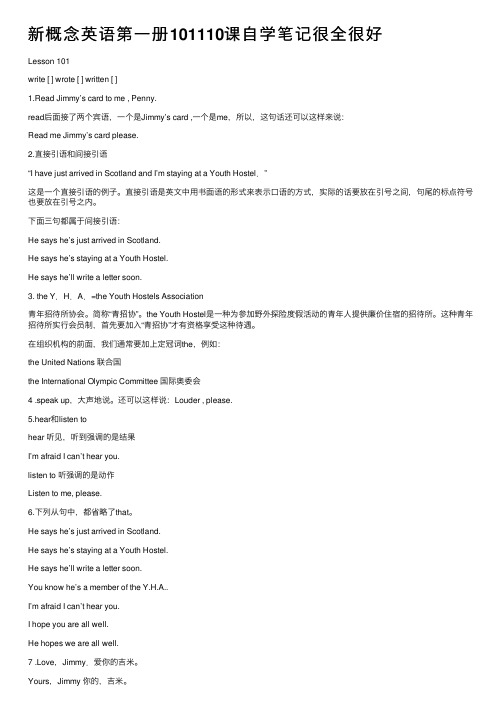
新概念英语第⼀册101110课⾃学笔记很全很好Lesson 101write [ ] wrote [ ] written [ ]1.Read Jimmy’s card to me , Penny.read后⾯接了两个宾语,⼀个是Jimmy’s card ,⼀个是me,所以,这句话还可以这样来说:Read me Jimmy’s card please.2.直接引语和间接引语“I have just arrived in Scotland and I’m staying at a Youth Hostel.”这是⼀个直接引语的例⼦。
直接引语是英⽂中⽤书⾯语的形式来表⽰⼝语的⽅式,实际的话要放在引号之间,句尾的标点符号也要放在引号之内。
下⾯三句都属于间接引语:He says he’s just arrived in Scotland.He says he’s staying at a Youth Hostel.He says he’ll write a letter soon.3. the Y.H.A.=the Youth Hostels Association青年招待所协会。
简称“青招协”。
the Youth Hostel是⼀种为参加野外探险度假活动的青年⼈提供廉价住宿的招待所。
这种青年招待所实⾏会员制,⾸先要加⼊“青招协”才有资格享受这种待遇。
在组织机构的前⾯,我们通常要加上定冠词the,例如:the United Nations 联合国the International Olympic Committee 国际奥委会4 .speak up,⼤声地说。
还可以这样说:Louder , please.5.hear和listen tohear 听见,听到强调的是结果I’m afraid I can’t hear you.listen to 听强调的是动作Listen to me, please.6.下列从句中,都省略了that。
新概念英语第1册第101-102课重点语法

新概念英语第1册第101-102课重点语法第101-102课的内容:一、重要句型或语法1、宾语从句(间接引语)1)用来作宾语的句子叫做宾语从句,如:He says he's just arrived in Scotland. 在第102课里,教材罗列了常见的宾语从句的主句动作。
2)本课侧重间接引语的内容,并且是省略连接词that的用法。
如:He says he's staying at a Youth Hostel.2、非谓语动词这里所指的非谓语动词不是通俗意义上所指的动名词、分词和不定式,而是广义上说的所有不能直接做谓语的动词。
在第102课,教材汇总了之前学过的非谓语动词,即系动词(状态系动词be和感官系动词)、助动词(will)和情态动词(can、must和need)。
二、课文主要语言点Read Jimmy's card to me please, Penny. read...to sb.,读...给某人听。
I have just arrived in Scotland and I'm staying at a Youth Hostel.' 1)可提问学生为什么此处两个动词分别采用了现在完成时和现在实行时。
2)提问学生两句话中地点的前面为什么一个用in,另一个却用at。
3)youth,青年。
hostel,招待所、宾馆。
He says he's just arrived in Scotland. He says he's staying at a Youth Hostel. 解读省略that的间接引语。
You know he's a member of the Y. H. A. 1)本句的you know后面接的是省略连接词that的宾语从句,可参考教材第207页表格中的宾语从句的种类汇总。
2)the Y. H. A.,完整形式为:the Youth Hostels Association,青年招待所协会。
新概念英语第一册101——144课语法及单词解析
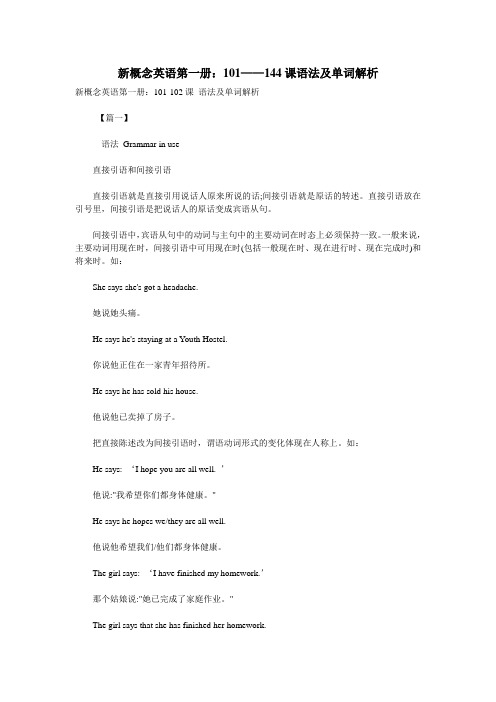
【篇三】
suit v.
(1)适合;适宜于:
Finding a place that suits us all is very difficult.
Tell him to move it.
让他搬它。
(3)不定式的否定形式是在to之前加not:
He decided not to buy the house.
他决定不买这幢房子。
He told me not to close the window.
他让我不要把窗户关了。
Tell him not to move it.
thin----thinner----thinnest
C许多单音节形容词以-e结尾,如nice。这些形容词只需在原级形式后加-r和-st:
large----larger----largest
nice----nicer----nicest
D有些形容词以-y结尾,而在-y前是一个辅音字母。这些形容词一般有两个音节。变为比较级和高级时,-y要变成-i,末尾再加-er和-est:
他希望自己能通过法语考试。
I want to leave.
我想离开。
(2)有许多动词可以带名词/代词宾语(通常是人称代词宾格),后面再跟不定式(动词+名词/宾格代词+to…):
I want you to carry it.
我想让你扛着它。
He wants them to listen to it.
他想让他们听那个。
(1)构成
A大多数单音节形容词的比较级和高级的构成是在其原级后面加上-er和-est:
small----smaller----smallest
新一L101-104
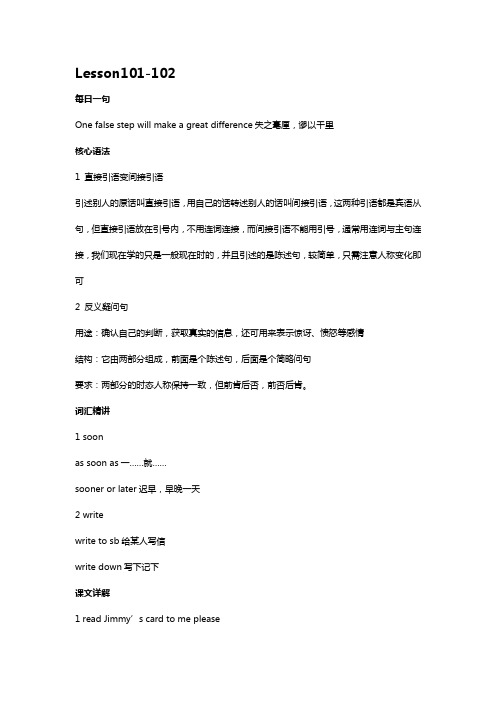
Lesson101-102每日一句One false step will make a great difference失之毫厘,谬以千里核心语法1 直接引语变间接引语引述别人的原话叫直接引语,用自己的话转述别人的话叫间接引语,这两种引语都是宾语从句,但直接引语放在引号内,不用连词连接,而间接引语不能用引号,通常用连词与主句连接,我们现在学的只是一般现在时的,并且引述的是陈述句,较简单,只需注意人称变化即可2 反义疑问句用途:确认自己的判断,获取真实的信息,还可用来表示惊讶、愤怒等感情结构:它由两部分组成,前面是个陈述句,后面是个简略问句要求:两部分的时态人称保持一致,但前肯后否,前否后肯。
词汇精讲1 soonas soon as一……就……sooner or later迟早,早晚一天2 writewrite to sb给某人写信write down写下记下课文详解1 read Jimmy’s card to me pleaseRead sth to sb把……读给某人听Read sth for sb体某人读2 you know he’s a member of the YHAYou know 后街宾语从句Be a member of是……的成员3 what else does he saywhat else其他什么;when else其它什么时间;where else其它什么地方who else其他什么人4 speak up还可以说Louder,please; Loudly,pleaseLesson103-104每日一句Penny and penny laid up will be many积涓成流,集腋成裘词汇精讲1 examExamination常指综合性考试,如期中考试,期末考试,入学考试midterm exam期中考试final exam期末考试entrance exam 入学考试Test:单项技能的考试,或测验。
- 1、下载文档前请自行甄别文档内容的完整性,平台不提供额外的编辑、内容补充、找答案等附加服务。
- 2、"仅部分预览"的文档,不可在线预览部分如存在完整性等问题,可反馈申请退款(可完整预览的文档不适用该条件!)。
- 3、如文档侵犯您的权益,请联系客服反馈,我们会尽快为您处理(人工客服工作时间:9:00-18:30)。
read sth to sb 读给某人听 read sth for sb 替某人读
P: He says he's just arrived in Scotland. He says he's staying at a Youth Hostel. You know he's a member of the Y.H.A.
card
n. 明信片
youth
n. 青年
hostel
n. 招待所,旅馆
association
n. 协会
sritten) v. 写
• 明信片的由来 :
• 1865年,德国有一位画家(名字未 考证)在一张硬纸上画了一幅画, 同时写上几句问候的话,打算寄给 他的朋友,但找不到有这多大的信 封来装寄,后来在邮局职员的建议 下,这画上图案的硬纸背后上,写 上朋友的地址和姓名寄出,这就是 明信片的鼻祖。
该国的青年人 一 般都有礼貌
The youth of the nation is polite in general. 2)青年(少年)时期,青春时期 他少年时代在美国度过
He spent his youth in the U.S.A 他年轻时学过意大利语。
He studied Italian in his youth. 3)青春
你报告写好了没有? 用英文写
write in English Write to sb. 给某人写信 我一个月给我家人写两封信。 I write to my family twice a month.
G: Read Jimmy's card to me please, penny.
P: 'I have just arrived in Scotland and I'm staying at a Youth Hostel.'
G: The what? P: The Y.H.A., Mum.
The Youth Hostels Association.
2. He says he's just arrived in Scotland.
析:宾语从句,做动词say的宾语 也叫间接引语
即要把别人所说的话转述给另一个人
直接引语:
3.You know (that) he's a member of the Y. H. A. a member of... …的成员之一。 eg. He is a member of our class.
ill tired
What does he say? He says that he is/feels tired.
What’s the matter with them
They say that they are thirsty
cold
thirsty
a cold
an earache
What’s the matter with him/them? He says that he has a cold.
the International Olympic Committee
--soon adv. 1)不久
他不久就会回来。
He will be back soon.
演在晚餐之后很快就开始了。
The show began soon after dinner.
2)快,早
Winter has come too soon.
• 10、‘Love, Jimmy.’ 信的末尾表示问候 的常用语。
• =Yours, Jimmy.’
G: Is that all? He doesn't say very much, does he?
P: He can't write very much on a card, Mum.
• 13、He doesn't say very much, does he?
4. 当陈述部分的主语是指示代词this, that或these, those时,附加疑问句中的主语分别用it和they。如: This is important, isn’t it? These are your friends Tom and Jack, aren’t they?
5. 当陈述句为there be结构时,附加疑问句中用there。 如: There’s no help for it, is there? There’s something wrong, isn’t there?
Lesson 101 A card from Jimmy
• Where is Jimmy staying at now?
• Does Grandmother seem pleased to get a card from Jimmy? Why/Why not?
单词学习
Scotland
n. 苏格兰(英国)
She lost her youth. 她青春不再
She kept her youth. 她青春依旧
association n. 协会 我父亲是牙医协会的会长。
My father was the president of the dental association.
在组织或者机构前要加定冠词the the United Nations
a headache
a toothache
a haricut an X- ray
What does he want/need? He says that he needs a haircut
a licence some money
wait catch
What can/must/will he do? He says he can/must/will catch the bus.
repair sell
(补充)反意疑问句 1. 当陈述部分的主语是I,而句子又用来征询对方的
意见时,附加疑问句中的主语用you。如: I find English very interesting, don’t you? I don’t like that film, do you?
• 当陈述部分的主语是everybody, everyone, someone, nobody, no one, somebody等合成 代词时,附加疑问句中的主语通常用they。但亦 可用he,尤其是nobody, no one等作主语,具有 否定概念时。如: Somebody phoned while I was out, didn’t they? Nobody wants to go there, does he?
• 8、Speak up. • = Louder, please. • = Say it loudly, please.
• 9、I'm afraid (that) I can't hear you. • hear listen to
• hear 听见,及物动词,强调结果 • Can you hear me at the back? • listen to听,不及物动词,强调动作 • Listen to me/the music, please!
冬天来得太早了
The sooner, the better.
越快越好
as soon as
一…就…
你一完成就告诉我
Tell me as soon as you have finished.
--write v. 写 请你把姓名,地址写在这里。 Write your name and address here, please.
• 1) He says , “I’m going to Beijing.” • → He says that he is going to Beijing. • 2) He says, “I am ill.” • → He says that he is ill.
练习题
1.She says, “I am a bus drive.” • She says that she is a bus driver. • 2.He says, “I feel tired.” • He says that he feels tired. • 3.She says , “I’m reading.” • She says she is reading.
6.陈述部分带有seldom, hardly, never, rarely, few, little, nowhere, nothing等否定词或半否 定词时,附加疑问部分的动词用肯定形式。如: Bob rarely got drunk, did he?
如果陈述部分的否定词带有否定前缀,那么,该 陈述部分作肯定处理,附加疑问部分一般仍用否 定形式。如:
card
n. 明信片,卡片
post card 明信片
credit card 信用卡
an ID card 身份证
a birthday card
生日卡片
a new year card
新年贺卡
名片(business card)
扑克
Play cards 打扑克
--youth 1)n. 青年人,年轻人(单复数同形)
• 6、What else does he say? • 这里else是“其他、另外”的意思。
• 7、‘I'll write a letter soon. I hope (that) you are all well.’
• soon 不久之后,是一般将来时的标志词。 • as soon as 一……就…… • As soon as he comes,I’ll tell you.
He was unsuccessful, wasn’t he? Tom dislikes the book, doesn’t he?
